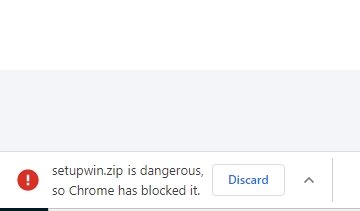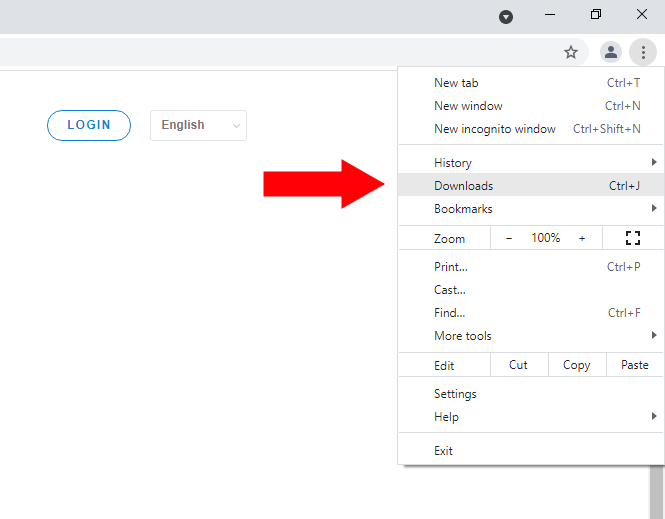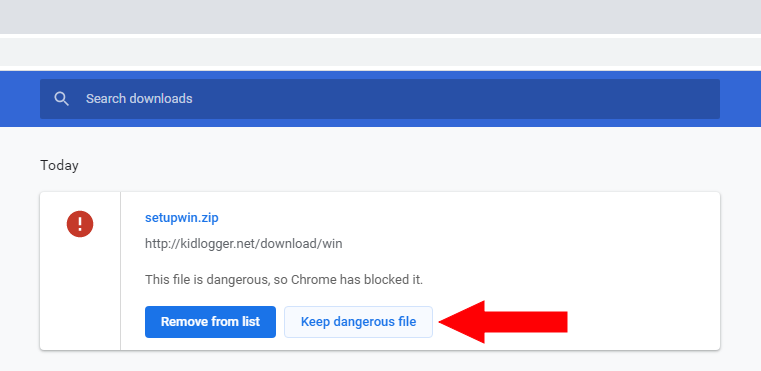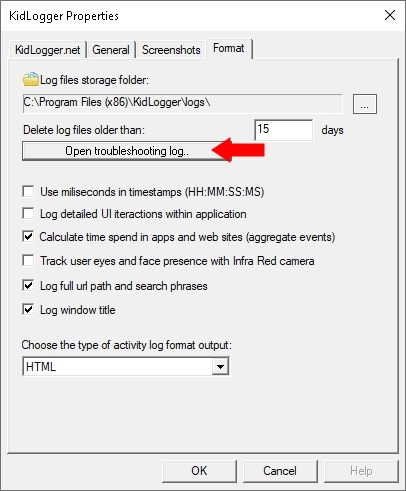Resolução de problemas para o Kidlogger para Windows
- O Google Chrome pode detectar o aplicativo KidLogger como um arquivo perigoso e interromper o download.

- Você precisa abrir o Menu do navegador Chrome e abrir a seção Downloads;

- Clique em Manter arquivo perigoso.

- O programa antivírus não sabe que está no computador do seu filho. Portanto, o programa de monitoramento pode ser reconhecido como spyware;
- Encontre o menu de configurações no seu software antivírus. Desative a proteção em tempo real temporariamente;
- Baixe o aplicativo KidLogger no seu computador. Instale-o e conecte-o à sua conta no servidor;
- Encontre a lista de exclusões nas configurações do programa antivírus. Adicione a pasta de trabalho do programa KidLogger lá. Por padrão, esta é C: \ Program files \ KidLogger;
- Ative a proteção em tempo real.
- Isso geralmente acontece se o programa foi instalado / executado não como administrador, mas simplesmente com um duplo clique. Nesse caso, o agente KidLogger não tem autoridade suficiente para monitorar outros usuários.
- Você precisa desinstalar o programa Kidlogger de sua pasta de trabalho (execute o arquivo Unins000.exe como administrador) e instalar o programa KidLogger novamente de acordo com as instruções.
- Se você conectou o agente Kidlogger à sua conta, usando não o endereço de e-mail, mas o ID do dispositivo do dispositivo existente, o agente Kidlogger monitorará apenas a conta de usuário atual. Você precisa fazer login na conta de usuário de destino no computador e iniciar o agente Kidlogger a partir de lá. E conectá-lo à sua conta online usando o e-mail ou ID do dispositivo.
Se o programa Kidlogger não recebeu a confirmação de criptografia, ele funcionará em modo reduzido. Os pais não verão capturas de tela, endereços da Web, textos ou sons.
- Após conectar o programa KidLogger ao servidor, você precisa reiniciar o computador. Isso garante que todas as contas no computador sejam desconectadas.
- Após reiniciar e fazer login novamente na conta, você será solicitado a confirmar a criptografia.
- Inicie o agente KidLogger no computador de destino e clique no botão "Conectar à conta". Abra, por favor, a guia Formato. Clique em Abrir log de resolução de problemas. Copie o arquivo report-USERNAME.txt e envie-o para o nosso serviço de suporte.

- Provavelmente, foi instalado um limite muito alto para o seu microfone. Faça login na sua conta de usuário no computador e abra a página de Configurações. Se você tiver dois ou mais dispositivos, escolha o necessário na lista.
- Encontre a opção Limite de gravação de áudio e reduza o valor.
- Salve as configurações e reinicie o computador de destino.
- Abrir as opções do aplicativo KidLogger. Na aba Geral, marque a opção "Registrar qualquer usuário neste PC".
- Abrir a pasta Program files\Kidlogger. Deve haver o arquivo lame_enc.dll. Ele pode ter sido apagado ou bloqueado por programas antivírus. Se for o caso, você precisa reinstalar o aplicativo KidLogger e adicioná-lo à lista de exclusões do antivírus.
- O KidLogger grava todos os símbolos digitados pelo usuário, até os que ele digita por engano e apaga posteriormente. O KidLogger usa a área de transferência do teclado e não pode identificar onde uma linha termina e outra começa. Por isso, às vezes, duas linhas são conectadas. Mas estamos melhorando o aplicativo e esperamos em breve conseguir separar as sentenças diferentes.
- O KidLogger não grava toda a área de transferência, mas apenas os primeiros 50 símbolos.
- Agora, todas as configurações devem ser alteradas a partir do servidor.
- Faça login na sua conta de usuário e abra a página de Configurações. Escolha o dispositivo desejado na lista.
- Altere as configurações. Clique em Salvar;
- Reinicie o computador de destino;
- Execute o KidLogger como administrador e pare o monitoramento.
- Feche o aplicativo.
- Execute-o novamente como administrador e verifique todos os usuários visíveis na janela principal.
- Inicie o monitoramento.
Se for um dispositivo Windows:
Faça login no computador como o usuário cujo dispositivo virtual foi excluído. Abra a pasta C:\Program Files (x86)\KidLogger e execute o arquivo kidlogger_user.exe de lá. Clique no botão Conectar ao servidor. Digite o endereço de e-mail registrado no servidor e clique em Conectar. Um novo dispositivo virtual será criado no seu painel de controle.
Verifique se o aplicativo KidLogger ainda está instalado no computador de destino. Ele deve estar na pasta C:\Program files(x86)\KidLogger.
Se não, instale-o novamente.
Se sim, inicie o arquivo KidLogger.exe como administrador, clique no botão Iniciar.
Você também precisa adicionar a pasta de trabalho do KidLogger à lista de exclusões do Windows Defender ou de outro antivírus instalado no computador: